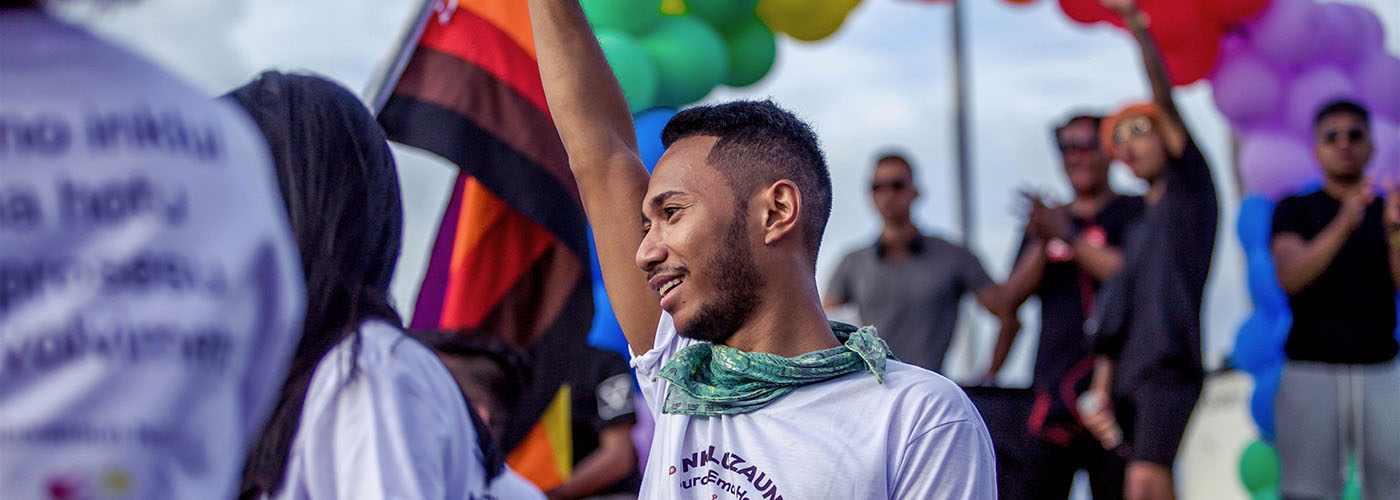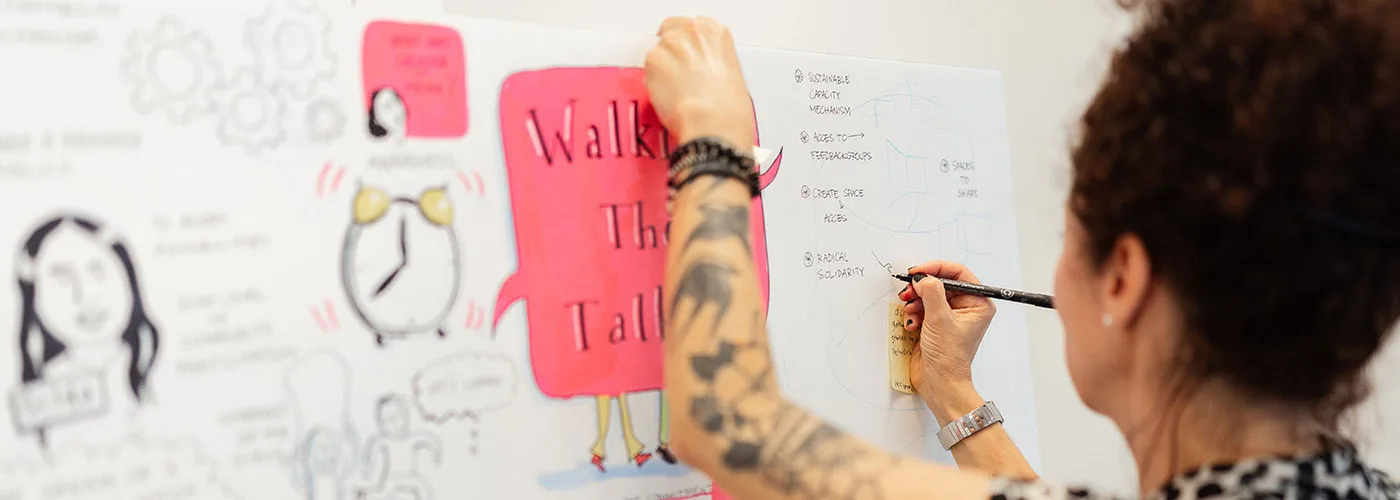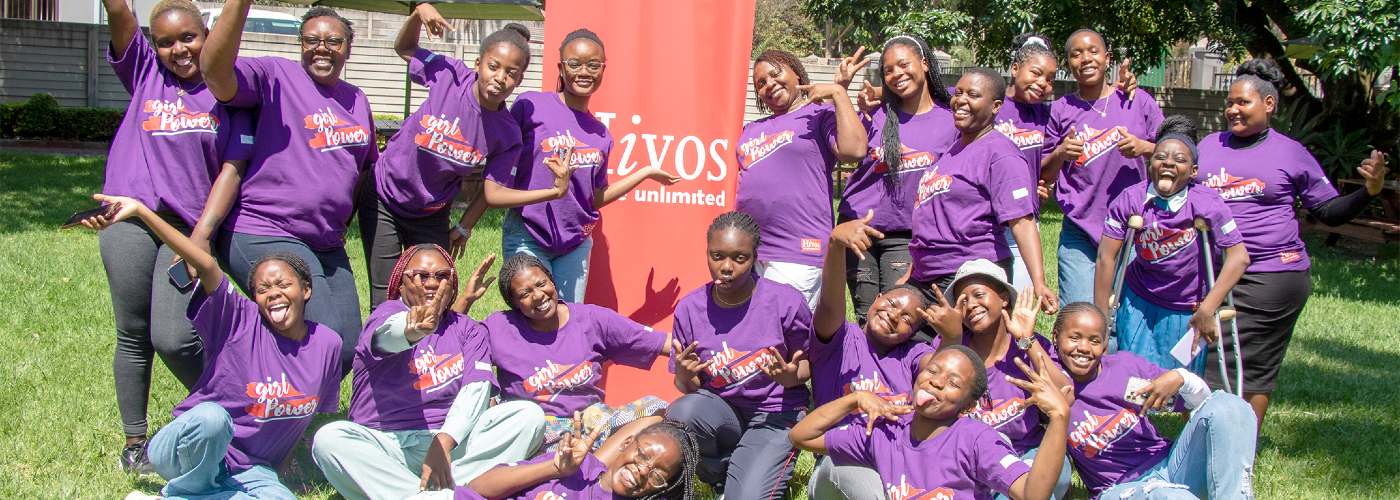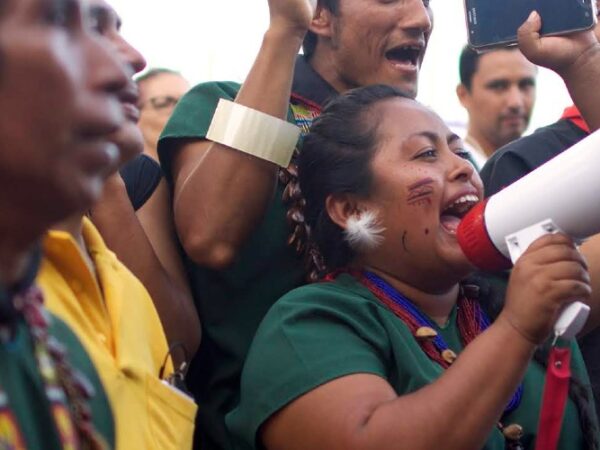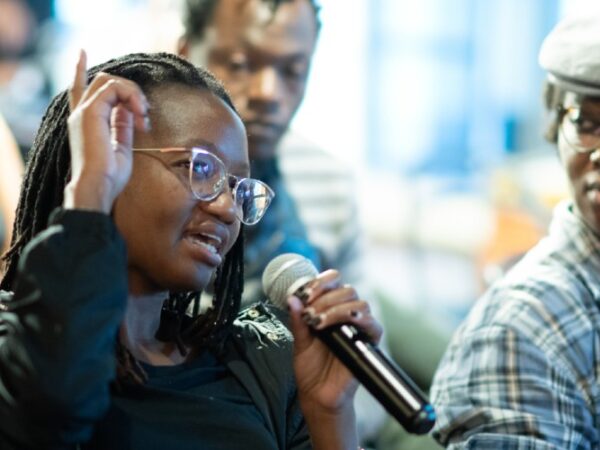Globally, we are seeing increasing marginalization, a steady loss of civic rights and freedoms, and the widening gap between rich and poor. Already facing bias and discrimination, women, people with diverse sexual orientations and gender identities, and other excluded groups are unfairly impacted by these trends. This prevents them from fully enjoying their human rights and taking or joining action to tackle the root causes of discrimination.
To combat this, we need new ways of generating broad social and institutional changes to advance gender equality, diversity, and inclusion (GEDI) and achieve equality for all. Hivos and our partners therefore directly support key rightsholders in securing the power, ability, and positions of leadership necessary to drive change.
What we want
Just, fair, dignified, and prosperous societies with inclusive economic and governing practices, where all people – including women and people with diverse sexual orientations and gender identities – have equal rights, responsibilities, and opportunities.
Our approach
Recognizing that there are multiple forms of discrimination that combine, overlap, or intersect (like racism and sexism), we put the concept of “intersectionality” at the center of our approach. The only way to ensure equal access to opportunities and resources for people who might otherwise be excluded is to root out all forms and combinations of discrimination in policy and practice.
Hivos believes in the power of people. We support rightsholders and their organizations by improving their individual and collective ability to claim their rights and hold duty bearers to account. But advancing gender equality, diversity, and inclusion is a lengthy process. It requires constant work and needs to be guided by rightsholders’ lived realities. So we focus on three thematic areas where Hivos can make a real difference based on our track record.
1. Access to inclusive sexual and reproductive health and rights (SRHR)
We work to uphold women’s, girls’, and LGBTIQ+ people’s sexual and reproductive health and rights (SRHR) by altering discriminatory norms and behavior that prevent them from accessing SRH information and services. This is to ensure that women, girls, and LGBTIQ+ people have real control over their bodies. In other words, that they can freely and responsibly make decisions about their reproductive health and sexuality without pressure, discrimination, or violence.
2. Economic justice
We advocate for the rights of women and LGBTIQ+ people to access economic resources, opportunities, and services as well as to influence and participate in economic decision-making. This means improving both women’s access to and control over resources and decent work and LGBTIQ+ groups’ ability to demand a fair share in economic development programs. We back this up with research showing the economic consequences of exclusion experienced by these groups.
3. Increasing women’s, youth and LGBTIQ+ leadership and political participation
We work to increase women’s, youth and LGBTIQ+ leadership and political participation at all levels of decision-making. To ensure they are listened to, included and represented in political and social decision-making, we provide funding and training to improve their leadership skills and organizational capacity. We specifically support women’s representation and leadership positions in civic and political institutions and their participation in all levels of peace processes.
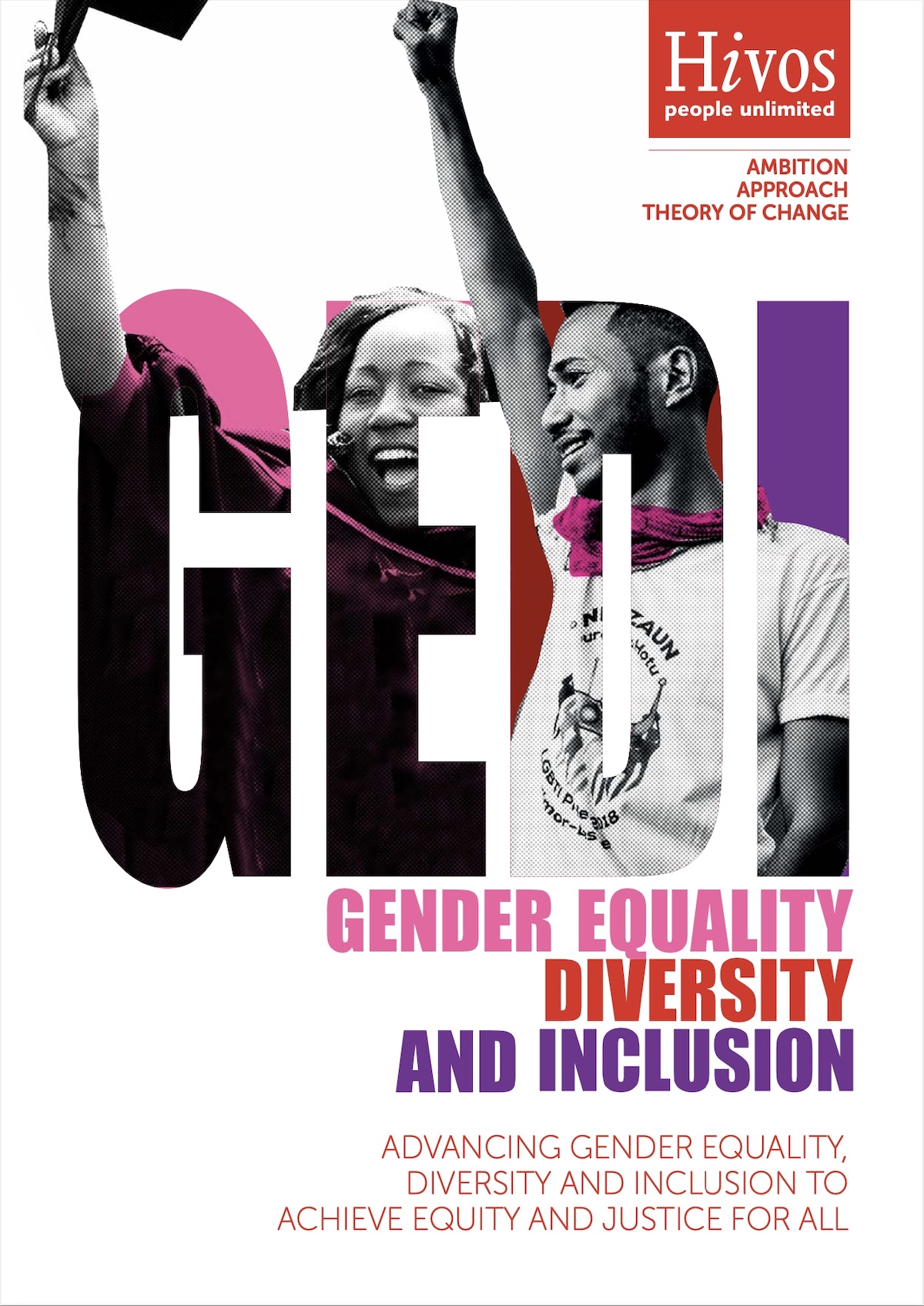
-
- We will continue to champion gender equality diversity and inclusion as a prerequisite to achieving more just, fair, dignified, and prosperous societies.
- We will practice intersectional feminism by always unpacking power and recognizing the impacts of different forms of systemic discrimination and that every person has multiple identity factors that impact their participation, their agency and who they are.
- We will promote human rights and dignity for all free from harm, violence, and exploitation. Until we are all free, none of us is free.
- We will ensure that our partnerships and programmatic work are grounded on the principle of self-determination - where bodily integrity and autonomy, voice, choice, and agency are prerequisites to the right to decide and for enabling resilient rightsholder movements and societies.
- We recognize that trust, mutual accountability, and sharing power are critical drivers for us to deliver our mission without perpetuating further marginalization, racism, or discrimination against those that we are called to serve. Hivos will continue to boost local ownership in our programs, within our organization, and among donors and the development sector.
- We will engage in ongoing critical (self) reflection to ensure that GEDI principles are adequately reflected in our programs, staff, and management. We will therefore strive to create a diverse and inclusive working environment that is reflective of the communities we serve and continuously address structural inequalities and discrimination in our partnerships and workplace.
- We commit to zero tolerance to discrimination and will call out any forms of discrimination and abuse of power in our workplace and in our partnerships. As an institution, we commit to support those who speak-out and encourage ongoing dialogues centered on the values of do no harm including accountability and transparency in our safeguarding practices.
Gender Equality, Diversity and Inclusion programs
Hivos has a long track record of supporting rightsholders, activists and organizations that work for LGBTIQ+ rights and inclusion, SRHR, and women’s empowerment. Inspiring examples amongst our programs are:
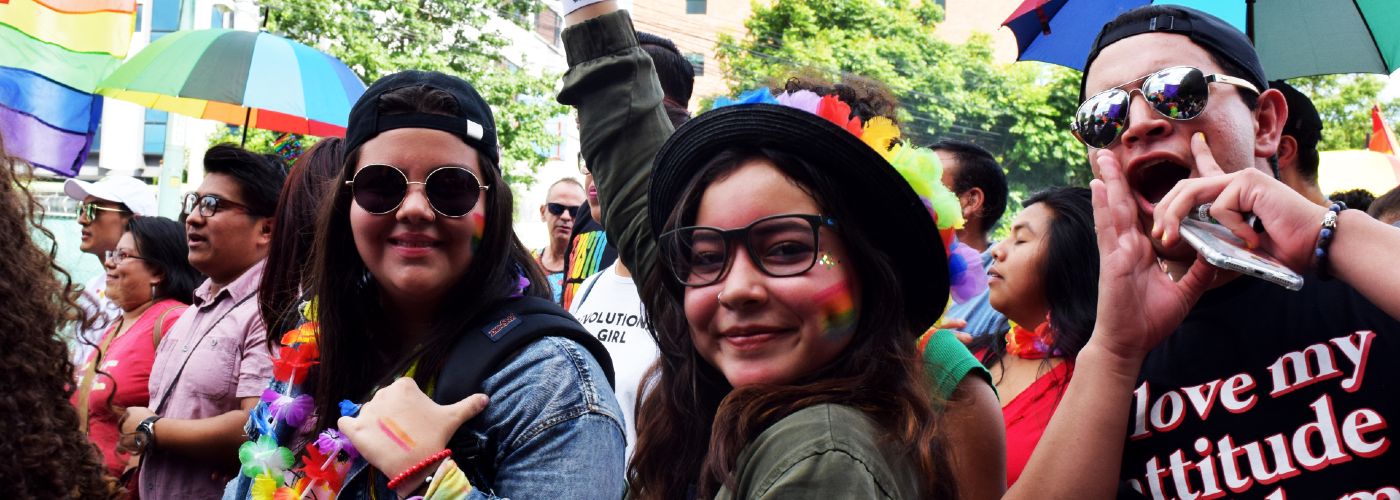
Free to be Me
Free to be Me builds and maintains a movement of self-confident and diverse LGBTIQ+ organizations and activists who advocate for their human and socio-economic rights.
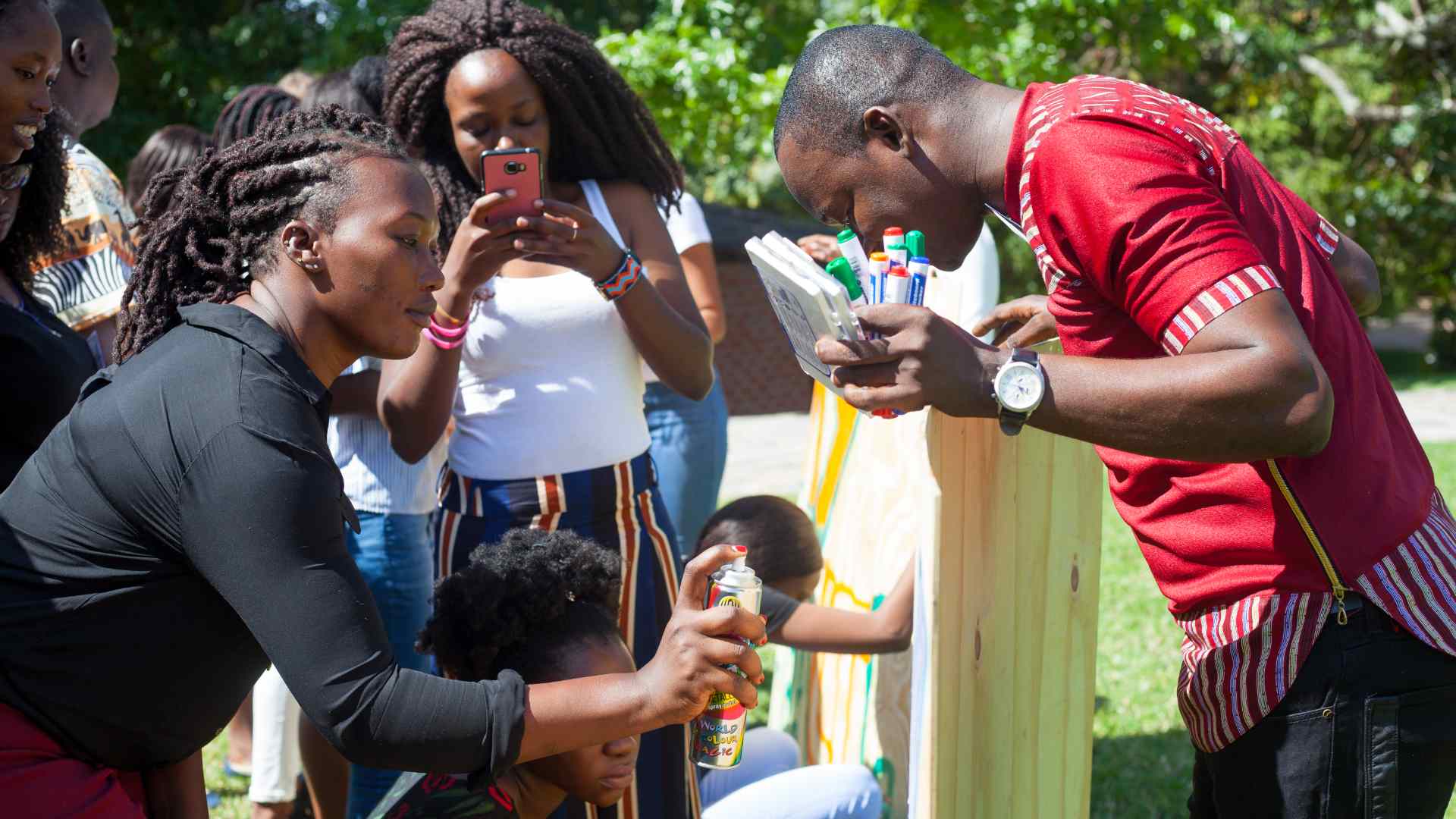
We lead
We Lead aims to strengthen the influence and position of young women whose sexual and reproductive health and rights (SRHR) are neglected the most.
Key terminologies
-
Our understanding and practice of gender equality is based on all people’s equal rights, responsibilities, and opportunities regardless of age, gender, sexual orientation or gender identity, ethnicity, ability, religion, age, among other grounds.
-
We use the term diversity when discussing equal rights and opportunities because people (rightsholders) differ. It refers to the practice and quality of including or involving people/rightsholders from different social, political, and ethnic backgrounds and of different genders, sexual orientations, social-economic class, amongst other determinants.
-
The term inclusion describes our active, intentional, and ongoing engagement with diversity as described above. And the degree to which we meaningfully engage with people who might otherwise be excluded or marginalized, ensuring they have equal access and resources to participate fully in society.
-
We use the term rightsholders to highlight the power of women, girls and LGBTIQ+ people, rather than focus on their marginalization through other common terminologies.
-
We use the acronym LGBTIQ+ to refer to lesbian, gay, bisexual, trans, intersex and queer people; the ‘+’ indicates that these terms have a limited scope, and not all people who are marginalized because of their sexual orientation, gender identity or expression, or sex characteristics (SOGIESC) self-identify with these terms.
-
We use the term women as an inclusive category to include cis-gender, transgender and intersex women and women of all ages, including girls.
-
Intersectionality is an analytical framework for understanding how aspects of a person’s social and political identities combine to create different modes of discrimination and privilege, as expressed by Kimberlé Crenshaw (1989). The idea is that when it comes to thinking about how inequalities persist, categories like gender, race, and class are best understood as overlapping and mutually constitutive rather than isolated and distinct.
Gender Equality, Diversity and Inclusion within Hivos
Hivos applies GEDI principles to all its programs. Some examples are ENERGIA’s work with women entrepreneurs in the renewable energy sector and our support for LGBTIQ+ defenders through our Digital Defenders Partnership. We set minimum GEDI objectives and strategies for all programs.
Within Hivos, we ensure that our organizational culture and partnerships also follow these principles. From our Supervisory Council to our projects and partners, we are committed to making gender equality, diversity and inclusion an integral part of our own organization and the way we involve communities and other stakeholders. Hivos’ GEDI Strategy guides this process, and we hold ourselves accountable and report on our progress.

